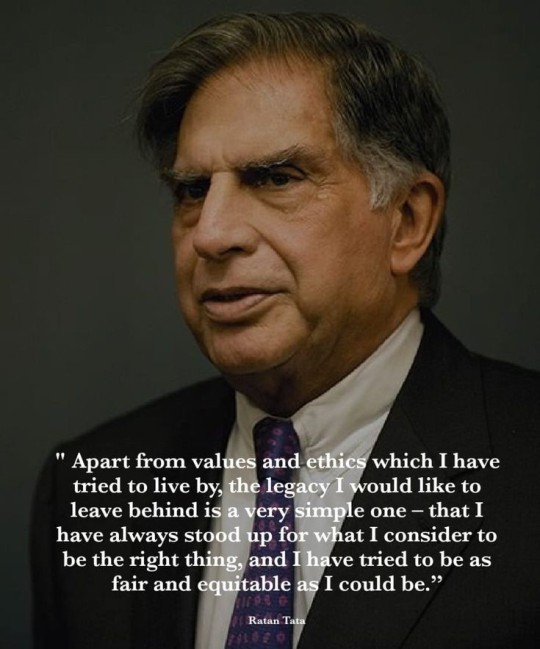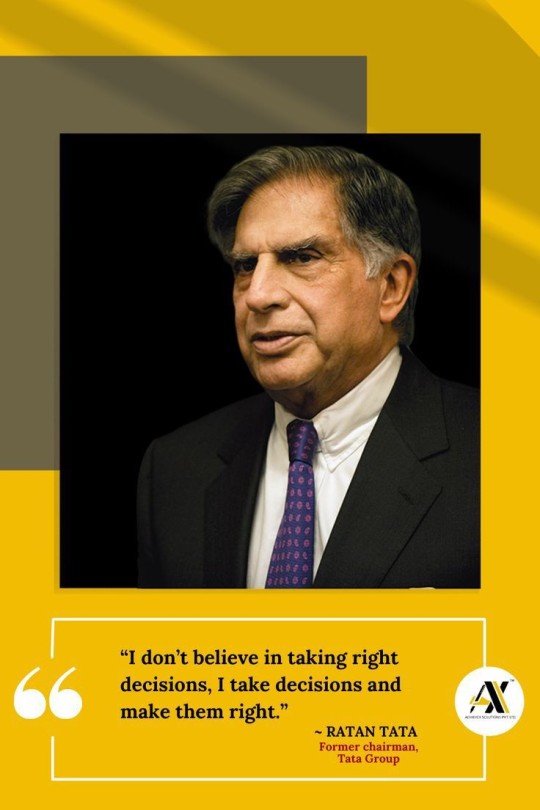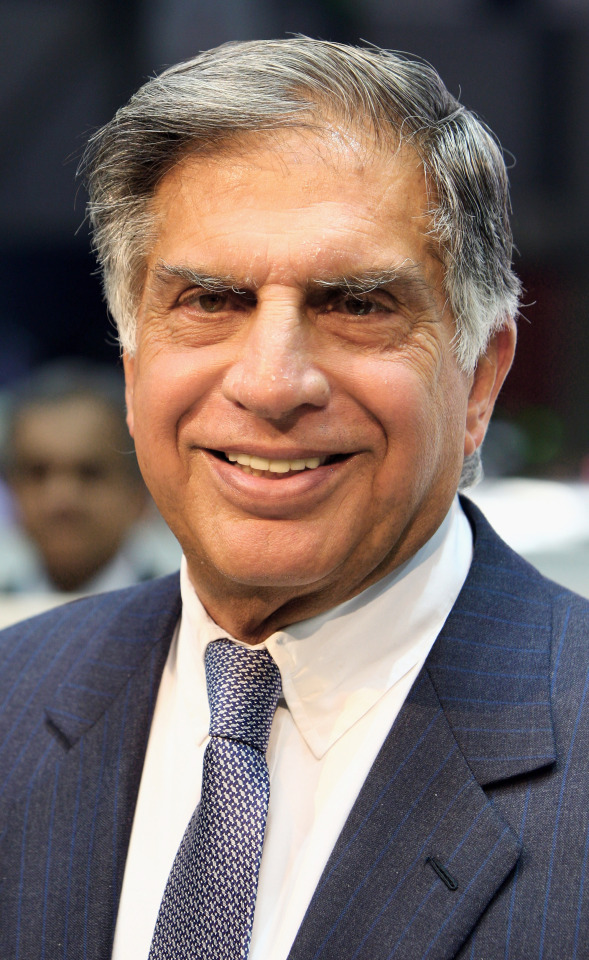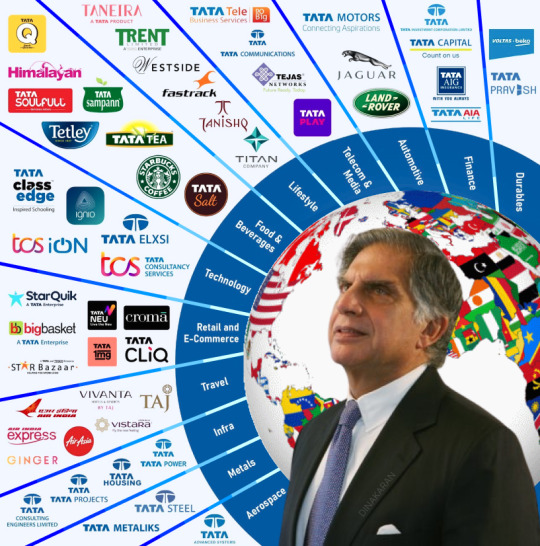#RATAN TATA
Explore tagged Tumblr posts
Text
We really lost the real" RATAN" of India
44 notes
·
View notes
Note
Sorry but I want to ask: what genocide did ratan tata enable? I looked it up but I'm finding nothing except this- https://x.com/thind_akashdeep/status/1844260311907348906 ik you are not on here to teach, but I just want to know
tata, like many indian capitalists, is arming the genocide of palestinians
37 notes
·
View notes
Text


Ratan Tata Sir was not just an industrialist; he was the epitome of what it means to be a true leader—one who put ethics, humanity, and compassion above all else. His leadership transformed the Tata Group into a global powerhouse, yet his humility and dedication to improving society never wavered.
He once said, "Ups and downs in life are very important to keep us going, because a straight line even in an ECG means we are not alive." This resilience and optimism defined his approach to both business and life, always staying grounded despite his towering achievements.
What set him apart was his unwavering commitment to philanthropy. Whether in education, healthcare, or rural development, his contributions were vast, but he never sought recognition for them. His generosity extended beyond humans, as he was a staunch advocate for animal welfare, showing compassion for stray dogs and championing initiatives for their well-being.
He believed, "I don’t believe in taking the right decisions, I take decisions and then make them right." These words capture his courage, humility, and relentless pursuit of excellence. Ratan Tata Sir taught us that true success is not measured by wealth, but by how you uplift others.
His legacy of kindness, integrity, and vision will continue to inspire millions. Rest in peace, Sir. The world is a better, kinder place because of you.
#ratan tata sir#ratan tata#legacy of kindness#visionary leader#leader#inspiration to generation#philanthropist#pride of india#indian#news#rest in peace
29 notes
·
View notes
Text

11 notes
·
View notes
Text

#ratan tata#motivation#quotes#poetry#literature#relationship quotes#writing#original#words#love#relationship#thoughts#lit#prose#spilled ink#inspiring quotes#life quotes#quoteoftheday#love quotes#poem#aesthetic
10 notes
·
View notes
Text
Ratan Tata passed away ?! Not only our country, but this world lost a gem.
7 notes
·
View notes
Text
Ah fuck, we lost a legend.


But the English can stay mad 😘
#ratan tata#rest in peace to the only Indian car manufacturing boss I respect#also: MOST of the English can stay mad. my girlfriend who is a Sensible English is good and acceptable#'reverse colonialism' is literally the funniest phrase I've ever heard
7 notes
·
View notes
Text

Ratan Tata
Indian business tycoon who turned his family’s Tata Group into a global player, and invested heavily in British industry
Ratan Tata, who has died aged 86, was India’s most celebrated industrialist. He modernised the unwieldy business empire founded by his great grandfather in the 19th century and internationalised it. In the process he spread his interests into western countries, with mixed results.
For the UK, that included the £271m purchase of the Tetley Group in 2000, followed more controversially by the acquisition of the steel company Corus for £6.2bn in 2007. Then, in 2008, Tata, himself a car enthusiast, added the troubled Jaguar Land Rover motor business for a further £1.75bn.
He joined the family firm, Tata Steel, in 1962. Educated in the US, and newly qualified as an architect, the young Tata had, he said, no intention of returning to India. But family ties won out. When his ailing grandmother, Navajbai, who had raised him, asked him to return he did so. He was soon promoted, building his reputation with tough reorganisation, followed by more troubleshooting at the electronics and textile companies.
In 1981, he was made chairman of Tata Industries, and found himself confronting an assortment of separate businesses, with different ownership patterns over which there was little formal control. He made a blueprint for reorganisation, having spent time at the Harvard Business School, but it was rejected after opposition from semi-autonomous bosses.
However, in 1991, the 81-year-old patriarch of the group, JRD Tata, chose him as his successor as the overall chairman. Asked why, he replied: “He has a modern mind.”
Tata soon demonstrated it with a tough programme of reshaping that, against continuing opposition, brought closures, job reductions, and the departure of the heads of the steel, hotel and chemical businesses.
He began to focus more on brands and less on heavy industry, and he benefited from the deregulation of Indian industry championed by Rajiv Gandhi. As part of it, he took the company more heavily into the motor industry. Tata lorries already dominated Indian highways, but now he moved into the car business in line with his own enthusiasms. While always seen as a man of modest habits, he had his own lovingly maintained collection of high-powered and classic cars, and delighted in driving them along Mumbai’s Marine Drive most Sundays.
Tata produced what was called “the first Indian car”, designed by and for Indians, in 1998. Ratan did some of the first drawings himself. The Tata Indica was a success. But when he went further a decade later, and the company conceived the Nano, a tiny saloon described as the world’s most affordable car at a price of about £2,000, the project failed. Such a cheap car was not enticing even to those “on two wheels” whom he hoped to attract.
In 1999 Tata had travelled to Detroit to discuss the sale of the motor business to Ford, only to be asked why his firm had gone into the passenger car business when it clearly knew nothing about it. Later he would turn the tables, buying underperforming Jaguar Land Rover from Ford and reviving it.
With sell-offs and cutbacks, Tata reorganised the group into 98 operating companies from more than 250, reducing the labour force by more than a third. He forged alliances with foreign companies and went into information technology.

He stepped down in 2012, observing the compulsory retirement rule he had himself introduced, but was still regarded as “chairman emeritus” and was brought back unhappily for a few months when his successor was sacked four years later.
His most shocking day came in 2008, when terrorists took over the Tatas’ Taj Mahal hotel on the front at Mumbai with great loss of life. The company has continued to support staff affected and the families of those who died.
Ratan was born in Mumbai, into the large Parsi Tata family, whose wealth came from a scattered collection of businesses including textiles, hotels, engineering, steel and tea. His father, Naval, had been adopted by the son of the founder, Jamsetji Tata. After Naval and his wife, Soonoo, separated when Ratan was seven, the child was brought up with his younger brother, Jimmy, by his grandmother in a grand Tata mansion in central Mumbai.
Aged 17 he was sent to the US to attend Riverdale Country school in New York City, from where he entered Cornell University in Ithaca, New York. He studied engineering before switching to architecture, graduating in 1959. He worked as an architect for a while in Los Angeles before returning to India, and Tata Steel.
In his 20 years at the helm, Tata’s sales grew by 22% annually and its international revenues rose from a quarter to 58% of the total, while Tata Consultancy Services became Asia’s largest software company.
His British investments have been among his less successful. Corus was bought for an over-the-top £6bn just before the global financial crash devastated the industry. Tata claimed it as “the first big step that Indian industry has taken as a global player”. It was later described by a senior Tata executive as “worthless”. The firm is currently negotiating terms of new investment at Port Talbot, which would be accompanied by hundreds of redundancies, while huge plants on Teesside and Scunthorpe have already been closed or sold for a nominal sum.
Jaguar Land Rover was initially a happier story. Tata’s major investment, including in research and development, made the company for a while the largest foreign investor in British industry. But eight years of profits have been followed by losses since 2018.
Surveying the British scene in 2011, Tata told the Times: “Nobody seems to want to exert the effort to make the UK truly competitive. It’s a work ethic issue. In my experience in both Corus and JLR, nobody is willing to go the extra mile.”
He was a major figure in the international business community, close to US politicians as well as the Indian government, advising the former prime ministers Gordon Brown and David Cameron, and sitting on the boards of multinational institutions.
He was also known as a major philanthropist. Many of the Tata companies were owned through trusts he chaired, and huge sums were provided for medical research and university projects both in India and abroad, particularly in the US, where a number of campuses have buildings bearing his name.
A softly spoken man, renowned for his courtesy, he never married, although he described himself as having come close four times. He was known for living modestly, although his recreations included flying his private jet and driving his collection of expensive cars, as well as a speedboat. He was noted for his love of dogs. The Tata headquarters in Mumbai had kennels and made provision for street dogs, and he was a donor to canine charities. In 2014 he was made GBE.
He is survived by Jimmy, by his stepmother, Simone, a half brother, Noel, and two half sisters, Shireen and Deanna.
🔔 Ratan Tata, businessman, born 28 December 1937; died 9 October 2024
Daily inspiration. Discover more photos at Just for Books…?
6 notes
·
View notes
Text
"Slow success builds character, fast success builds Ego."
-Ratan Tata
#ratan tata#inspiring quotes#quote#deep quotes#note to self#self awareness#self reminder#spilled words#spilled thoughts#spilled ink
18 notes
·
View notes
Text

भारत के महान उद्योगपति और प्रेरणादायक व्यक्तित्व श्री रतन टाटा जी का निधन राष्ट्र के लिए एक अपूरणीय क्षति हैं।
ईश्वर दिवंगत आत्मा को अपने श्री चरणों में स्थान दे।
ॐ शांति। 🙏💐
4 notes
·
View notes
Text
I was trying to spell rate, but I kept spelling rat bc I forgot the e
#funny#idk what im doing#idk man#spelling#spelling mistakes#dumbass#rat#rodent#ratatouille#ratan tata
5 notes
·
View notes
Text
Why Suzuki is Losing Market Share - Tata Car vs Maruti
youtube
Suzuki, particularly its Indian subsidiary Maruti Suzuki, has been facing challenges that have contributed to a decline in market share. Here are some key factors in comparison to Tata Motors:
1. Product Range and Innovation
Maruti Suzuki: Historically strong in the compact car segment, Maruti has struggled to innovate quickly in emerging segments like SUVs and electric vehicles (EVs). Their recent offerings may not resonate as strongly with changing consumer preferences.
Tata Motors: Tata has aggressively expanded its portfolio with popular models like the Nexon and Punch, focusing on stylish designs, advanced features, and strong safety ratings.
2. Electric Vehicle (EV) Strategy
Maruti Suzuki: The company's approach to EVs has been cautious, with a delayed entry compared to competitors. This has given Tata an edge, especially with models like the Nexon EV gaining traction.
Tata Motors: Tata has been proactive in launching EVs, positioning itself as a leader in this growing market.
3. Brand Perception and Marketing
Maruti Suzuki: While still a trusted brand, Maruti's image has become somewhat stale compared to newer entrants. Their marketing strategies may not appeal to younger consumers seeking more modern aesthetics and features.
Tata Motors: Tata has revitalized its brand image through aggressive marketing and positioning, appealing to a younger demographic with innovative designs and tech-savvy features.
4. Pricing and Value Proposition
Maruti Suzuki: While known for affordability, some consumers perceive Maruti vehicles as lacking in premium features, pushing them to consider alternatives.
Tata Motors: Tata has effectively balanced pricing with premium offerings, giving consumers more perceived value.
5. Distribution and Service Network
Maruti Suzuki: Although it has an extensive network, issues related to service quality or customer experience can impact brand loyalty.
Tata Motors: Tata has improved its service quality and expanded its reach, enhancing customer satisfaction and loyalty.
6. Market Dynamics and Competition
Competition: Tata Motors has effectively capitalized on market trends and consumer preferences, growing its market share at the expense of established players like Maruti.
Changing Consumer Preferences: Increasing demand for SUVs and EVs has shifted the market landscape, with Tata positioned to better meet these needs.
Conclusion
In summary, Maruti Suzuki's challenges stem from slower innovation, a cautious EV strategy, and an evolving market landscape. In contrast, Tata Motors has been agile in responding to consumer preferences and market trends, contributing to its growing market share. For Maruti to regain its footing, it may need to accelerate its product development and embrace new technologies more aggressively.
2 notes
·
View notes
Text
youtube
#artists on tumblr#life lessons#motivation#successful business#Successful story#inspiration#mindset#ratan tata#tata company#Youtube
2 notes
·
View notes
Text
नीता मुकेश अंबानी ने रतन टाटा को 'Son Of India' कहते हुए भावपूर्ण श्रद्धांजलि दी, मुकेश अंबानी सहित सभी लोगों ने खड़े होकर उन्हें नमन किया #NitaAmbani #MukeshAmbani #RatanTata #RIP #Tata #nma #NMA2024
2 notes
·
View notes

